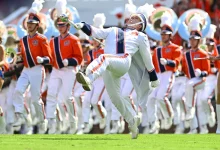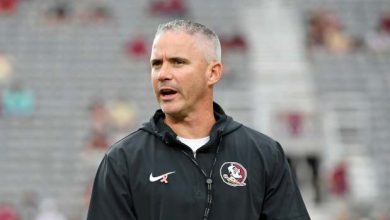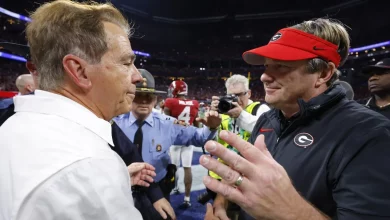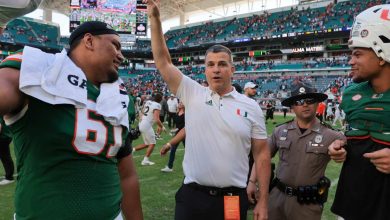Auburn head coach Hugh Freeze discussed his vision for the sport’s future, addressing key issues like player safety, fairness, and the evolving role of technology in football.
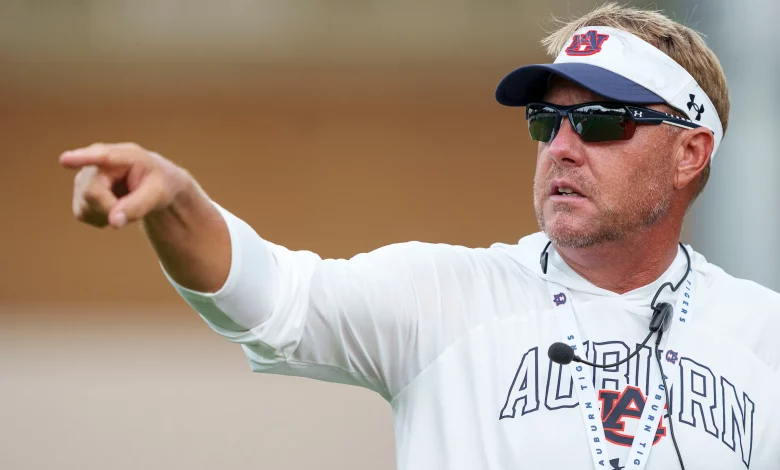
Auburn head coach Hugh Freeze recently spoke to reporters about his hopes and concerns for what college football—and the sport as a whole—might look like five to ten years from now. Asked a broad question about the future of football, Freeze took the opportunity to address several pressing topics shaping the game’s trajectory, including player safety, fairness, and the growing influence of technology.
His thoughtful reflections underscore the complex challenges facing the sport as it evolves, as well as the potential paths forward to preserve football’s core excitement while improving the experience for players, coaches, and fans alike.
Player Safety: The Paramount Concern
One of the foremost issues Freeze highlighted was player safety, an area that has become increasingly prominent in recent years. With growing awareness about the long-term health consequences of concussions and other injuries, coaches, leagues, and medical experts have intensified efforts to protect athletes at all levels.
Freeze emphasized the importance of continuing to advance medical protocols, equipment standards, and rule changes aimed at minimizing dangerous contact without diminishing the game’s competitive edge.
“We have to keep finding ways to make the game safer,” Freeze said. “It’s about protecting the players who make this sport what it is, so they can enjoy healthy lives long after their careers end.”
The Auburn coach pointed out that while football is inherently physical, innovation in helmet technology, better tackling techniques, and stricter enforcement of safety rules could dramatically reduce injuries.
He also called for expanded education and resources to help players understand the risks and make informed decisions about their health. Freeze stressed the importance of not only preventing injuries but also supporting players’ physical and mental well-being throughout their time in the sport.
Ensuring Fairness and Integrity in the Game
Freeze’s vision for football’s future also included a focus on fairness and maintaining the integrity of competition. The increasing commercialization of college sports, debates over athlete compensation, and concerns about recruiting practices have all raised questions about what fairness means in modern football.
“We need a level playing field where every player and every program has a chance to compete honestly,” Freeze noted.
He expressed support for ongoing reforms related to name, image, and likeness (NIL) policies, which allow athletes to benefit financially from their personal brands. However, he also warned about potential pitfalls, such as the widening gap between programs with vast resources and those without.
Freeze suggested that governing bodies should continue refining rules to promote transparency and equity, ensuring that all athletes, regardless of their school or background, receive fair treatment and opportunities.
Additionally, the coach underscored the importance of upholding sportsmanship and respect within the game, encouraging players and coaches to lead by example.
The Role of Technology: Challenges and Opportunities
Another major theme in Freeze’s remarks was the growing role of technology in football, both as a tool for enhancing performance and as a potential disruptor of traditional aspects of the game.
He noted that advancements in analytics, video review, and communication have transformed how teams prepare and compete.
“Technology has given us incredible tools to understand our opponents, improve our own play, and make smarter decisions on the field,” he said.
From wearable sensors that monitor player health to advanced film study software, coaches now have unprecedented resources to tailor training and strategies.
At the same time, Freeze raised caution about relying too heavily on technology, warning it could alter the spontaneity and human element that make football exciting.
He also touched on the impact of replay and officiating technologies, recognizing their value in improving fairness but noting that slowdowns and interruptions can affect the game’s flow and viewer experience.
Balancing technological innovation with preserving the sport’s traditional feel remains an ongoing challenge Freeze acknowledged with nuance.
Preparing Players for Life Beyond Football
Beyond the immediate concerns of the game itself, Freeze spoke passionately about the responsibility coaches have in preparing players for life after football.
He pointed out that most college athletes will not play professionally and need support to succeed in careers and personal lives beyond sports.
“Football is important, but it’s not everything,” Freeze emphasized. “We have to help young men grow into well-rounded individuals who can thrive no matter what path they choose.”
This involves academic support, character development, and life skills training, areas where Freeze said programs like Auburn are investing more resources.
His comments reflect a broader shift in college athletics toward holistic player development, recognizing that success on the field should be matched by success off it.
Embracing Change While Honoring Tradition
Throughout his discussion, Freeze conveyed a deep respect for football’s traditions and cultural significance, balanced with an openness to thoughtful change.
He acknowledged that the sport must evolve to address modern challenges but cautioned against abandoning what makes football unique.
“We want to protect the heritage and passion that draw millions to this game every year,” Freeze said. “At the same time, we must be willing to adapt so the sport remains safe, fair, and relevant.”
This mindset positions Auburn as a program that values both legacy and innovation, seeking to lead by example as college football charts its future course.
Fan Experience and Growing the Game
While not the central focus, Freeze briefly touched on the importance of enhancing the fan experience, both in stadiums and through digital platforms.
He recognized that capturing younger audiences and embracing new ways to engage fans will be critical for football’s continued growth.
“Fans are the heart of the sport,” he said. “Finding ways to bring them closer to the action and make the experience more interactive is key.”
Whether through improved broadcasting technology, virtual reality, or social media, Freeze sees opportunities to connect with fans globally while maintaining the communal spirit of game day.
A Vision Rooted in Responsibility and Optimism
Auburn head coach Hugh Freeze’s reflections on football’s future reveal a thoughtful leader attuned to the sport’s evolving landscape. His emphasis on player safety, fairness, responsible use of technology, and player development highlights the multifaceted challenges facing the game.
Freeze’s balanced approach—honoring tradition while embracing necessary change—offers a roadmap for college football as it seeks to navigate an uncertain but promising future.
As the sport continues to grow and adapt, voices like Freeze’s play a vital role in shaping policies and cultures that prioritize the well-being of athletes and the enjoyment of fans.
For Auburn fans and college football followers alike, Freeze’s vision serves as a reminder that while the game may change, its core values of competition, teamwork, and community remain steadfast.


